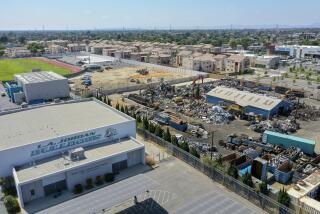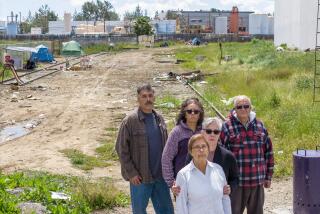Massey Energy’s safety record questioned after mine explosion
- Share via
Reporting from Washington — Massey Energy Co. has been cited for repeated mine safety violations in recent years, racking up hundreds of penalties at the Upper Big Branch mine, where an explosion Monday killed at least 25 workers.
Federal prosecutors also have brought two criminal complaints for violation of worker protection rules at other mines run by the company, the nation’s sixth-biggest coal-mining firm.
Massey officials say they have an above-average safety record and have received awards for their performance at individual mines. Last October, Massey President Baxter Phillips touted company safety awards and said, “We are very proud of this accomplishment and our members who work so hard to make Massey’s mines among the safest in the industry.”
But Davitt McAteer, head of the Mine Safety and Health Administration during the Clinton administration, said in an interview that “Massey has for some time had a problem with safety compliance and dealing with some of the really ordinary safety and precautionary issues.”
The explosion this week sends a clear message, he said. “They had an explosion that killed 25. Your system is not working.”
The company’s safety record was also challenged by legal opponents who have waded into internal documents of the criminal cases.
“They placed profits over safety repeatedly,” said Tonya L. Hatfield, a lawyer in the coal-mining town of Gilbert, W.Va., who has sued Massey in cases over a 2006 fire at the Aracoma mine, where 12 miners were trapped and two died. In that case the company agreed to pay $2.5 million in criminal fines. The fine, when combined with $1.5 million in civil penalties, was apparently the largest ever imposed in a coal-mining death case.
“Aracoma’s conduct in this case is clear and uncontroverted,” said Logan Circuit Judge Roger L. Perry, as reported by two local papers. “Given the voluntary admissions of guilt, it is clear not only that Aracoma acted with deliberate intent regarding the unsafe working conditions in its coal mine, it acted with criminal intent.”
An Oct. 19, 2005, company memo obtained in Aracoma litigation indicates that before the Aracoma fire, all of the company’s deep mine superintendents -- including at Upper Big Branch -- were put on notice by Massey Chief Executive Don Blankenship that coal production trumped any other concerns.
If they got instructions “to do anything other than run coal . . . you need to ignore them and run coal. This memo is necessary only because we seem not to understand that the coal pays the bills.” A week later, however, Blankenship sent a follow-up memo, saying that safety is the first responsibility.
In 2007, the operator of Massey’s White Buck mine in West Virginia was fined $50,000 for a criminal mine safety violation and a shift foreman was given a year of probation after pleading guilty to a misdemeanor charge of not performing safety examinations. As part of a plea agreement, prosecutors dropped a felony complaint that the company had falsified records to indicate that pre-shift safety reviews had been conducted.
Robert Luskin, a Washington lawyer who represented Massey in the two criminal cases, said that “Massey is the biggest [coal] operator in the state of West Virginia. For reasons that are perfectly understandable, prosecutors decided to focus their attention on Massey because it sends the best possible message across the industry.”
“The trend line for Massey shows that their [safety] incidents are consistently down when production is way up. Massey has been consistently above the national average” in mine safety, Luskin said.
Massey officials did not respond to requests for comment.
Massey’s Aracoma mine continues to have numerous safety violations, with 316 cited in the last year.
The Upper Big Branch, where Monday’s disaster occurred, was cited for 515 violations in 2009 and 124 so far this year, federal statistics show. The company was cited, among other things, for allowing combustible coal dust to accumulate.
Labor Department records show that before Monday, three workers have been killed at the mine in the last 12 years. A worker was electrocuted in 2003, another died after a roof collapse in 2001, and a third died when a beam collapsed in 1998.
Asked about the firm’s safety record, West Virginia Gov. Joe Manchin III said Tuesday that the company was within federal safety tolerance requirements. But, he added, the firm’s overall record “sure concerns me.”
Between 2001 and 2005, the federal government proposed fines of $236,000 for violations at the Upper Big Branch mine, and Massey paid nearly $235,000.
Since Congress enacted tougher mine oversight regulations in 2006, the government has proposed $1.77 million in fines at the mine, but Massey has paid only about $365,000 and contested most of the difference, federal records show.
Coal companies appeal fines to head off heftier penalties and to thwart the possibility of shutdowns, said Rep. George Miller (D-Martinez), who held a hearing on what witnesses termed an abuse of the process.
The backlog of fine appeals at the Federal Mine Safety and Health Review Commission has jumped to 16,000 cases from 2,100 in 2006, and the time needed for each case has increased to 401 days from 178, according to commission figures.
“If cases are stuck for months or years at the review commission, MSHA cannot impose stronger penalties for the worst mine operators,” Miller said. “As a result, miners’ lives are in the cross hairs.”
tom.hamburger@ latimes.com
More to Read
Inside the business of entertainment
The Wide Shot brings you news, analysis and insights on everything from streaming wars to production — and what it all means for the future.
You may occasionally receive promotional content from the Los Angeles Times.










